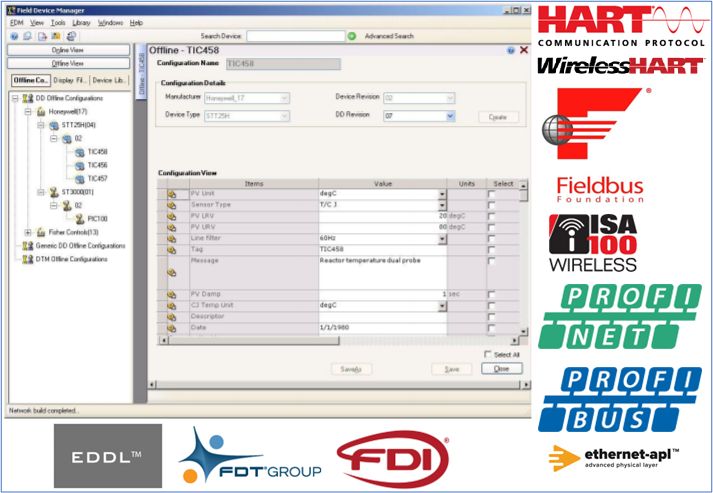instrument asset management
Experion® PKS Field Device Manager
Field Device Manager (FDM) is an instrument asset management system that allows instrument engineers to carryout commissioning & maintenance activities remotely.
Please sign in to access more documents
Once signed in, you may be able to access additional documents for your account.
All companies have key performance indicators (KPIs) to achieve significant reductions in operating costs and downtime. Modern manufacturing (petrochemical, refining) facilities have a mix of thousands of smart instruments from many vendors, and of various kinds. Every one of these smart instruments may provide anywhere from a dozen to many data points (process variables) in addition to the measured variables. Over and above this data, addition of configuration, calibration, and maintenance data, shall mean a lot of information to keep track of over the long term. Along with the signals normally used, a lot of information can be extracted from all this data by using data analytics. With the advent and subsequent introduction of microprocessor-based smart instruments in early 1980s and development in the 1990s of digital communication protocols such as HART, Foundation fieldbus, Profibus, and their brethren, an integrated approach to instrument diagnostics and maintenance is needed. This approach cuts operating and maintenance costs and reduce downtime, while contributing towards improving asset efficiency, uptime, and reliability. This also improves effectiveness of maintenance and operations staff and improve the safety of some maintenance activities. Increasingly, plants have turned to instrument asset management systems (AMS) to improve their process efficiency, reduce maintenance requirements, and enhance overall productivity. Plants achieve significant reductions in operating costs and production downtime because of implementing an effective instrument asset management strategy. Since a considerable percentage of manufacturing revenues are budgeted for maintenance, these savings contribute significantly to a company's bottom line.
What and Why?
Field Device Manager provides a significant benefit during commissioning of smart instrumentation. However, as soon as plant equipment is commissioned, it is subject to degradation. The process, human interaction, and time all conspire to corrupt the function of process equipment and associated field devices. To control and slow the decline, plant maintenance groups are responsible for the operational oversight and timely repair of equipment. Their challenge is to keep installed assets performing while also reducing the resources and personnel required for the maintenance function. A local operator interface or handheld communicator can be used for temporary on-site interaction with smart field instrumentation devices. The requirement then arises for a means to interface with field instruments on a continuous plant-wide basis to capture preventative maintenance information and conduct appropriate remote servicing activities. That is the basic function of Field Device Manager.
Field Device Manager is required to meet the myriad requirements of a modern petrochemical plant, which will get less simple and more complex over time.
A facility may have instruments not only from many different manufacturers but also from different Control System/PLC vendors. Hence, managing only a subset is unlikely to give the desired rate of return and meet a plant’s goals. An open standards-based Field Device Manager serves as an enabler for a plantwide instrument integration.
The Technology
It is well proven that field devices and equipment supporting digital technologies provide benefits to a process plant’s operation. Digital devices offer a plethora of data about the operating environment. This data is then utilized by applications that prevent losses or disruptions, enhance quality and reliability, and reduce maintenance costs. A primary reason for the growth and popularity of digital device technology has been the broad adoption of Honeywell DE, HART, Foundation fieldbus, Profibus, Profinet, and open standards like FDI, FDT, DDs.
The Data
The rest of the unique information in a smart instrument used for configuration, calibration, troubleshooting, maintenance, and diagnostics is described via Device Description (DD) files, it refined EDDL (Electronic Device Description Language), and other technologies like FDT (Field Device Tool)/DTM (Device Type Manager). These contain an electronic description of parameters and functions needed by Field Device Manager to communicate with the device.
Benefits of Field Device Manager
FDM focuses on instrument device commissioning, configuration management, troubleshooting, and thereby enables instrument engineers to carryout maintenance activities remotely.
Another area of benefits that is not always mentioned is process safety, and the aspects of reliability that impact process safety. Field Device Manager integrated with Honeywell’s Asset Performance & Analytics suite of applications enables instrument as well as reliability engineers to monitor all assets and ensure the reliability and safety of a process.
For patent information, see www.hsmpats.com
Please sign in to view part numbers available for purchase based on your account Sign In


